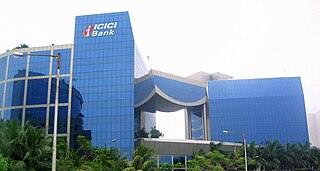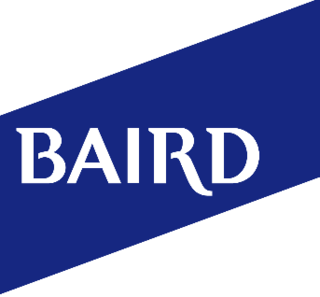
Business is the activity of making one's living or making money by producing or buying and selling products. Simply put, it is "any activity or enterprise entered into for profit."
A holding company is an outstanding stock of other companies. A holding company usually does not produce goods or services itself. Its purpose is to own shares of other companies to form a corporate group.
Bank fraud is the use of potentially illegal means to obtain money, assets, or other property owned or held by a financial institution, or to obtain money from depositors by fraudulently posing as a bank or other financial institution. In many instances, bank fraud is a criminal offence. While the specific elements of particular banking fraud laws vary depending on jurisdictions, the term bank fraud applies to actions that employ a scheme or artifice, as opposed to bank robbery or theft. For this reason, bank fraud is sometimes considered a white-collar crime.

ICICI Bank Limited is an Indian multinational financial services company with its registered office in Vadodara, Gujarat, and corporate office in Mumbai, Maharashtra. It offers a wide range of banking products and financial services for corporate and retail customers through a variety of delivery channels and specialized subsidiaries in the areas of investment banking, life, non-life insurance, venture capital and asset management. The bank has a network of 5,275 branches and 15,589 ATMs across India and has a presence in 17 countries.

Sumitomo Mitsui Banking Corporation Group is a Japanese multinational banking and financial services institution headquartered in Yurakucho, Chiyoda, Tokyo, Japan. The group operates in retail, corporate, and investment banking segment worldwide. It provides financial products and services to a wide range of clients, including individuals, small and medium-sized enterprises, large corporations, financial institutions and public sector entities. Since 2011, it has been included into the Financial Stability Board's list of global systemically important banks.

Corporate law is the body of law governing the rights, relations, and conduct of persons, companies, organizations and businesses. The term refers to the legal practice of law relating to corporations, or to the theory of corporations. Corporate law often describes the law relating to matters which derive directly from the life-cycle of a corporation. It thus encompasses the formation, funding, governance, and death of a corporation.

A privately held company, private company, or close corporation is a corporation not owned by the government, non-governmental organizations and by a relatively small number of shareholders or company members, which does not offer or trade its company stock (shares) to the general public on the stock market exchanges, but rather the company's stock is offered, owned and traded or exchanged privately or over-the-counter. More ambiguous terms for a privately held company are closely held corporation, unquoted company, and unlisted company.
Piercing the corporate veil or lifting the corporate veil is a legal decision to treat the rights or duties of a corporation as the rights or liabilities of its shareholders. Usually a corporation is treated as a separate legal person, which is solely responsible for the debts it incurs and the sole beneficiary of the credit it is owed. Common law countries usually uphold this principle of separate personhood, but in exceptional situations may "pierce" or "lift" the corporate veil.
TCF Financial Corporation was a Wayzata, Minnesota-based national bank holding company until 2019, when it was purchased by the Chemical Financial Corporation, which adopted the TCF name. As of December 31, 2013, TCF had $18.4 billion in total assets and nearly 430 branches in Minnesota, Illinois, Michigan, Colorado, Wisconsin, Indiana, Arizona, and South Dakota, providing retail and commercial banking services. TCF, through its subsidiaries, also conducted commercial leasing and equipment finance business in all 50 states, commercial inventory finance business in the United States and Canada, and indirect auto finance business in 45 states.

In business, consolidation or amalgamation is the merger and acquisition of many smaller companies into a few much larger ones. In the context of financial accounting, consolidation refers to the aggregation of financial statements of a group company as consolidated financial statements. The taxation term of consolidation refers to the treatment of a group of companies and other entities as one entity for tax purposes. Under the Halsbury's Laws of England, 'amalgamation' is defined as "a blending together of two or more undertakings into one undertaking, the shareholders of each blending company, becoming, substantially, the shareholders of the blended undertakings. There may be amalgamations, either by transfer of two or more undertakings to a new company, or to the transfer of one or more companies to an existing company".
A corporate spin-off, also known as a spin-out, or starburst or hive-off, is a type of corporate action where a company "splits off" a section as a separate business or creates a second incarnation, even if the first is still active.
In the United States, a paper railroad is a company in the railroad business that exists "on paper only": as a legal entity which does not own any track, locomotives, or rolling stock.
An international business company or international business corporation (IBC) is an offshore company formed under the laws of some jurisdictions as a tax neutral company which is usually limited in terms of the activities it may conduct in, but not necessarily from, the jurisdiction in which it is incorporated. While not taxable in the country of incorporation, an IBC or its owners, if resident in a country having "controlled foreign corporation" rules for instance can be taxable in other jurisdictions.
China Banking Corporation, commonly known as China Bank, is a Filipino bank established in 1920. It was the first privately owned local commercial bank in the Philippines initially catering to the banking needs of Chinese Filipino businesspeople. It offers various banking services and products related to deposit, investment, trust, cash management, remittance, and financing products and services. It also offers insurance brokerage and bancassurance services through its subsidiary and affiliates.
Foreign corporation is a term used in the United States to describe an existing corporation that conducts business in a state or jurisdiction other than where it was originally incorporated. The term applies both to domestic corporations that are incorporated in another state and to corporations that are incorporated in a nation other than the United States. All states require that foreign corporations register with the state before conducting business in the state.

First Bank of Nigeria Limited (FirstBank), is a Nigerian multinational bank and financial services company headquartered in Lagos Nigeria. It is the premier bank in West Africa with its impact woven into the fabric of society. First Bank of Nigeria Limited operates as a parent company in Nigeria, with the subsidiaries FBNBank in the Republic of Congo, Ghana, The Gambia, Guinea, Sierra-Leone and Senegal; FBN Bank UK Limited in the United Kingdom with a branch in Paris; FirstBank Representative Office in Beijing to capture trade-related business between geographies. FirstBank also operates First Pension Custodian Nigeria Limited, Nigeria’s foremost pensions custodian. The teeming customers of the FirstBank Group are serviced from a network of over 700 business locations across Africa. To promote financial inclusion and reach the unbanked and underbanked, FirstBank has an extensive Agent Banking network, with over 53,000 agent locations across Nigeria. The Bank specialises in retail banking and has the largest client base in West Africa, with over 18 million customers. For eight consecutive years FirstBank received the Best Retail Bank in Nigeria award by The Asian Banker.

Robert W. Baird & Co. is an American multinational independent investment bank and financial services company. It is the principal U.S. operating subsidiary of Baird, an international, employee-owned financial services firm providing investment banking, capital markets, private equity, wealth management, and asset management services to individuals, corporations, institutional investors, and municipalities.
The New York State Banking Department was created by the New York Legislature on April 15, 1851, with a chief officer to be known as the Superintendent. The New York State Banking Department was the oldest bank regulatory agency in the United States.
Hilltop Holdings Inc. is a financial holding company based in Dallas, Texas. It offers financial products and banking services through four primary subsidiaries: PlainsCapital Bank, PrimeLending, and HilltopSecurities.

Infrastructure Leasing & Financial Services Limited (IL&FS) is an Indian infrastructure development and finance company.







